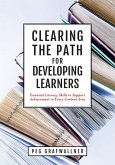Deep learning is possible for all students, regardless of subject, grade, or previous experience. In Loving What They Learn, author Alexander McNeece explains how high engagement nurtures the needs--for competence, autonomy, and content relevance--that students have, provides tools to measure how well those needs are being met in the classroom, and reveals science-based strategies that fill the gap.
See how to increase learner engagement:
Contents:
Introduction
Chapter 1: The Self-Efficacy Cycle
Chapter 2: Competence
Chapter 3: Autonomy
Chapter 4: Relatedness
Chapter 5: Relevance
Chapter 6: Culture Change
Epilogue: Going Forward
Appendix: Engagement Inventories
References and Resources
Index
See how to increase learner engagement:
- Study the engagement gap's impacts and how to create a lasting culture that bridges that gap, developing a growth mindset in learners.
- Encounter real-world anecdotes about different students, and see the research-based learning strategies in action.
- Become familiar with student needs and the effect their fulfillment has on student engagement and achievement.
- Discover dozens of research-backed teaching strategies that help fulfill students' various cognitive and affective needs, giving them increased autonomy and self-efficacy in the classroom.
- Self-assess how well engagement is cultivated in four domains, and compare those results with student engagement inventory data.
Contents:
Introduction
Chapter 1: The Self-Efficacy Cycle
Chapter 2: Competence
Chapter 3: Autonomy
Chapter 4: Relatedness
Chapter 5: Relevance
Chapter 6: Culture Change
Epilogue: Going Forward
Appendix: Engagement Inventories
References and Resources
Index
Dieser Download kann aus rechtlichen Gründen nur mit Rechnungsadresse in A, D ausgeliefert werden.









